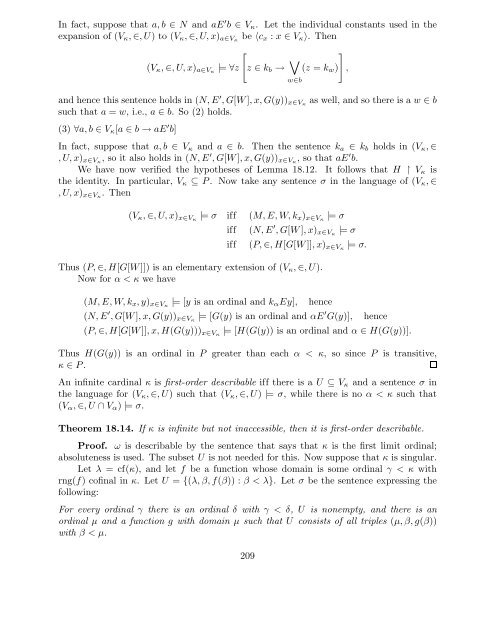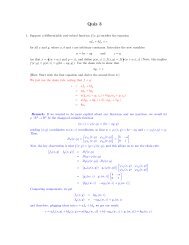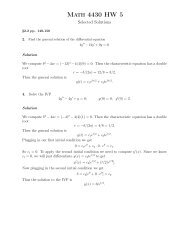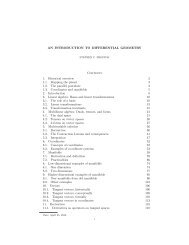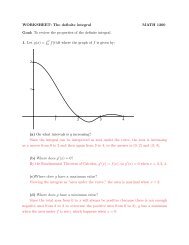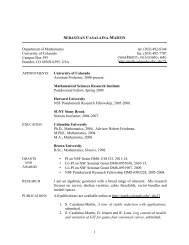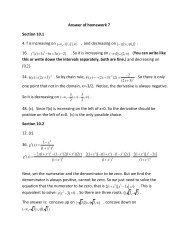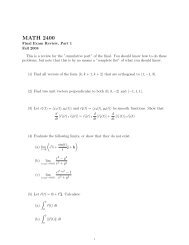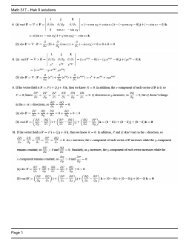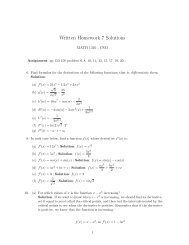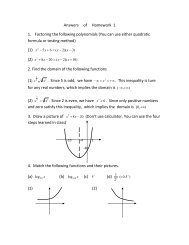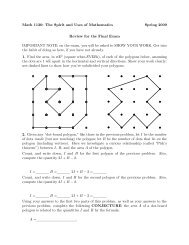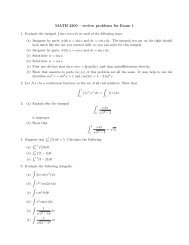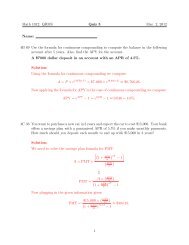18. Large cardinals
18. Large cardinals
18. Large cardinals
You also want an ePaper? Increase the reach of your titles
YUMPU automatically turns print PDFs into web optimized ePapers that Google loves.
In fact, suppose that a, b ∈ N and aE ′ b ∈ V κ . Let the individual constants used in the<br />
expansion of (V κ , ∈, U) to (V κ , ∈, U, x) a∈Vκ be 〈c x : x ∈ V κ 〉. Then<br />
(V κ , ∈, U, x) a∈Vκ |= ∀z<br />
[<br />
z ∈ k b → ∨ w∈b(z = k w )<br />
]<br />
,<br />
and hence this sentence holds in (N, E ′ , G[W], x, G(y)) x∈Vκ as well, and so there is a w ∈ b<br />
such that a = w, i.e., a ∈ b. So (2) holds.<br />
(3) ∀a, b ∈ V κ [a ∈ b → aE ′ b]<br />
In fact, suppose that a, b ∈ V κ and a ∈ b. Then the sentence k a ∈ k b holds in (V κ , ∈<br />
, U, x) x∈Vκ , so it also holds in (N, E ′ , G[W], x, G(y)) x∈Vκ , so that aE ′ b.<br />
We have now verified the hypotheses of Lemma <strong>18.</strong>12. It follows that H ↾ V κ is<br />
the identity. In particular, V κ ⊆ P. Now take any sentence σ in the language of (V κ , ∈<br />
, U, x) x∈Vκ . Then<br />
(V κ , ∈, U, x) x∈Vκ |= σ iff (M, E, W, k x ) x∈Vκ |= σ<br />
iff<br />
(N, E ′ , G[W], x) x∈Vκ |= σ<br />
iff (P, ∈, H[G[W]], x) x∈Vκ |= σ.<br />
Thus (P, ∈, H[G[W]]) is an elementary extension of (V κ , ∈, U).<br />
Now for α < κ we have<br />
(M, E, W, k x , y) x∈Vκ |= [y is an ordinal and k α Ey],<br />
hence<br />
(N, E ′ , G[W], x, G(y)) x∈Vκ |= [G(y) is an ordinal and αE ′ G(y)],<br />
hence<br />
(P, ∈, H[G[W]], x, H(G(y))) x∈Vκ |= [H(G(y)) is an ordinal and α ∈ H(G(y))].<br />
Thus H(G(y)) is an ordinal in P greater than each α < κ, so since P is transitive,<br />
κ ∈ P.<br />
An infinite cardinal κ is first-order describable iff there is a U ⊆ V κ and a sentence σ in<br />
the language for (V κ , ∈, U) such that (V κ , ∈, U) |= σ, while there is no α < κ such that<br />
(V α , ∈, U ∩ V α ) |= σ.<br />
Theorem <strong>18.</strong>14. If κ is infinite but not inaccessible, then it is first-order describable.<br />
Proof. ω is describable by the sentence that says that κ is the first limit ordinal;<br />
absoluteness is used. The subset U is not needed for this. Now suppose that κ is singular.<br />
Let λ = cf(κ), and let f be a function whose domain is some ordinal γ < κ with<br />
rng(f) cofinal in κ. Let U = {(λ, β, f(β)) : β < λ}. Let σ be the sentence expressing the<br />
following:<br />
For every ordinal γ there is an ordinal δ with γ < δ, U is nonempty, and there is an<br />
ordinal µ and a function g with domain µ such that U consists of all triples (µ, β, g(β))<br />
with β < µ.<br />
209


